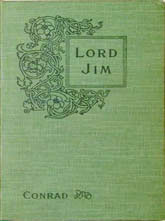Lord Jim
Critique • Quotes
 First edition, 1900
First edition, 1900First publication
1900
Literary form
Novel
Genre
Literary
Writing language
English
Author's country
England
Length
Approx. 155,000 words
The in-between romantic
Lord Jim is one of the Joseph Conrad novels that has me thinking at times "This may be the best writing I've ever read" and at other times "Come on, get on with it, would you?"
Part of this ambivalence can be put down to Conrad's position—along with a few other British and American writers like Thomas Hardy, Samuel Butler and Henry James—in a transitional phase of literary history. He brings us partway from the leisurely, gloriously elaborate writing of Dickens and other nineteenth century lights to the more understated, psychologically subtle style of popular twentieth-century masters.
Lord Jim is almost the perfect example of such an in-between book. On the "old" side is, first of all, the theme. The story of young Jim losing his honour, his integrity—his youthful dreams of himself as a noble being—through a cowardly act committed at sea, and the attempt to recover it, eventually by asserting himself as the ruler of a primitive people. Sounds like an old-fashioned tale of character building in the colonies. Stories of Rudyard Kipling, Robert Louis Stevenson and Stephen Crane come to mind. And who writes about honour anymore?
On the "modern" side is the ambivalence of narrator Marlowe toward Jim's quest for redemption. While not condoning character's desertion of passengers on a seemingly sinking ship, he understands the psychological motivations that led to a hasty error of judgment by an inexperienced sailor. He is cynical about the scapegoating inquiry that centres on Jim while ignoring greater perpetrators.
Obsolete values
Marlowe helps the disgraced lad find work in obscure corners of the world, but he doesn't sympathize with Jim's continued self-flagellation. Marlowe rather stands in for the modern reader who is both bemused and intrigued by this display of obsolete values. There's both admiration and exasperation in his dealings with Jim.
Marlowe/Conrad goes out of his way to paint the boy as a representative of Romanticism, with his original naive belief in his own noble fate, which is dashed so quickly, and with his continued pursuit of some ideal that is out of place in these times and in those places. Anti-romanticism is a theme to be picked up many times over by the jaded writers to come.
Then there's how the story is told. Peeled like an onion, is the obvious simile. Writers had told stories with broken timelines before this, but Conrad takes fragmented narrative to a different level. And he does it so skillfully that it often doesn't seem jagged. You become immersed in the human drama unfolding each moment. Then an essential part of the story from long previously is revealed and you suddenly remember you were waiting to learn this very point. Early on this happens even with some of the significant details of the scandal at sea and its surprising consequences, which are revealed later than expected, as asides almost.
At other times however, the roundabout narration is frustrating. As often in Conrad's works, most of the story is told by Marlowe to shipmates, purportedly in the course of an evening. In reality, no one would ever be able to hold an audience in thrall for such a long, convoluted monologue.
Getting the nuance right
But no matter. Marlowe/Conrad takes the time to try to make every scene as vivid as possible in the listener's/reader's mind. He has a compulsion to get the whole picture exactly right—with brilliant description of the setting, with creative insight into the characters' appearances, with sensitively elicited psychological nuance. The result can be overpowering, bringing the story more alive than ever experienced before. These are the times I think "Greatest. Work. Ever."
But then in the next scene he's trying to force the same phenomenon again, but without achieving lift-off. It remains tedious description. Detail. Seams appearing between fragments. I want to get to the next part and find out what happened (despite having read the story before) but I know I have a couple more byways to navigate before circling back to it.
Still a great work though. Lord Jim (and lovely title, by the way) has been criticized as being an overblown short story, or perhaps an overblown combination of two shorter stories: the scandal of the ship's desertion and the story of Jim's adventure as the man who would be benevolent king. Some comments from Conrad would seem to confirm such a conjunction as the origins of the novel. But, damn, it does work as a whole.
True, it is hard to think of the pathetic early shipboard Jim as the same character as the later tragic "Lord" of his realm. But however implausible it may be, the dynamic of the whole is engrossing. Moving from the squashing of one individual's romantic delusion to the destruction of one of the empire's smaller dirty secrets.
And, in the effort to make it work as well as it does, that wonderful—incredibly wonderful—writing periodically erupts. Redeeming all.
— Eric
Critique • Quotes

